#its just that shes terrified of failure and can have *episodes* of self-loathing when she fucks up
Note
do you have any particular thoughts regarding marcille being a half-elf? its interesting to me considering the fact that she seems self-conscious about being a half-elf, but denies it when its brought up
i remember marcille looking visibly uncomfortable over laios simply asking her how old she is, which i think the only reason she might feel nervous about this is because it might reveal her as a half-elf to him.
she's never corrected anybody whose called her an elf either.
never mind the circumstances of the reveal, in which thistle goes on about how half-elves are inferior and accusing her of wanting to become full blooded elf, she seemed particularly upset like he struck a nerve-
i wish the half-elf thing was built upon more. also, underrated marcille line:
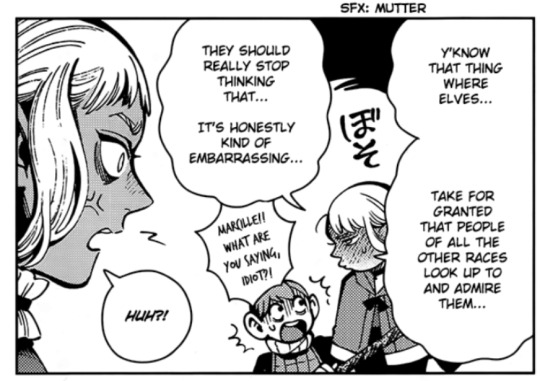
okay so i revisited this sequence just to make sure I could back myself up and it's just... man. there's a lot going on.
the first reaction we get from Marcille is this huge panel that takes up half of the page
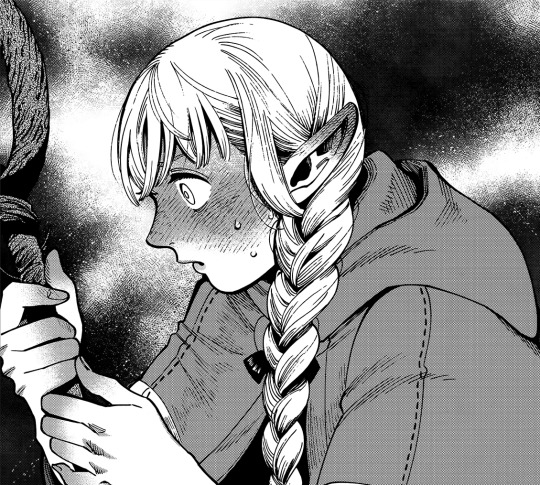
she is viscerally affected. flushing to the tips of her ears with the intensity of it. and we see it again, a few pages later
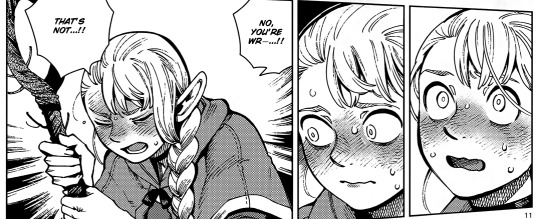
so it might seem like she's embarrassed about it and lying to herself, but... I really think it's just that Thistle is accidentally hitting sore spots. If you really look at what he says to get these reactions
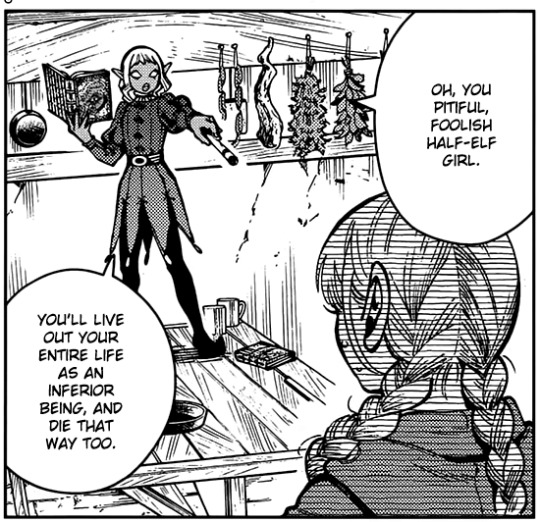
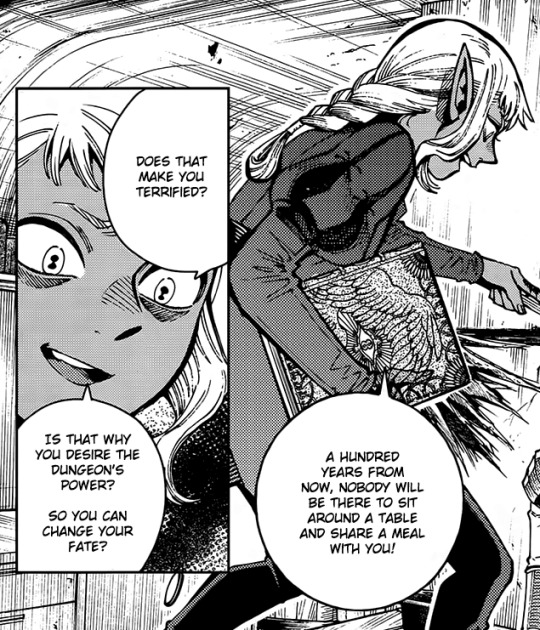
"you'll live out your entire life [...] and die that way too"
"a hundred years from now, nobody will be there"
Hear me out. I think, if he stuck to harping on about her inferiority without bringing up how terrifyingly long-lived she is, she wouldn't have been as bothered. But right now, Thistle is accidentally hitting all the marks on Marcille's deepest fears-- and this is after the Winged Lion promised her that her dreams could come true in an extremely vulnerable moment, so it also hits her slightly guilty conscience as well.
I do truly believe that Marcille isn't bothered about being a half-elf the way that people assume she'd be bothered by it. To her, the biggest problem with being a half-elf is that it's isolating.
On one hand, it's not hard to imagine why she'd distance herself from elves in the west. A lot of them can clock her as a half-elf on sight, unlike other races, and therefore she's always branded with this weird stigma of being Othered -- I would even say that she considers herself lucky for being born outside of elven culture instead of having to grow up in it. I mean, just... look at the way elves talk about her.
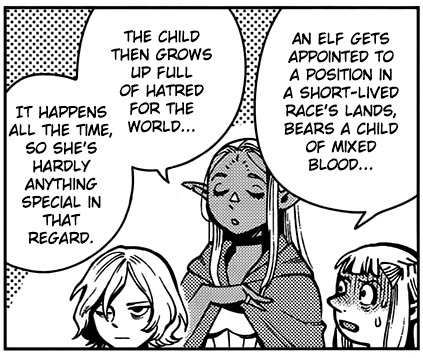

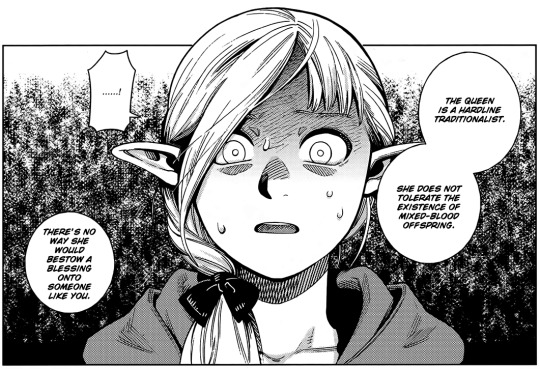
Skipping past the uncomfortable implication of what 'not tolerating the existence' of half-elves would actually entail, this is incredibly fucking annoying. You can see why she wouldn't want to be around elves much. You see a lot of Marcille reacting badly here, but honestly, almost all of it can be attributed to her freaking out that her bluff completely failed. She's honestly more paying attention to Izutsumi's footsteps and trying to coordinate an opportunity to escape.
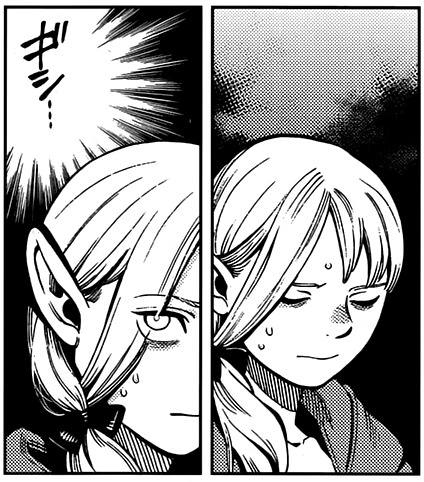
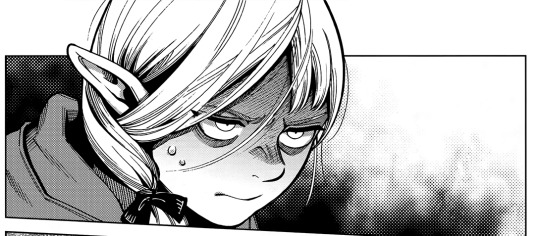
And in the end, you see her built-up frustration at being asked if she wants to be a full-blooded elf like 2-3 times in a row.
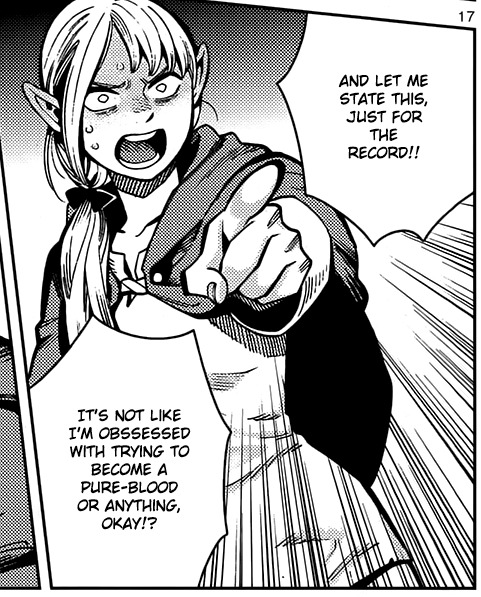
Yeah, yeah, "the lady doth protest too much," and all. But we know Marcille. We know that she's a lot more embarrassed and horrendously unconvincing when she's being prodded about something she's actually self-conscious about.
Moving onto the flipside of things, it might seem weird that she "pretends" to be a full elf around other races, but it's not really that strange if you think about it. Again, people are weird about her being infertile or whatever, and a lots of them don't even know much about what sets half-elves apart from everyone else. I mean, look at how uncomfortable Laios is just asking her about it
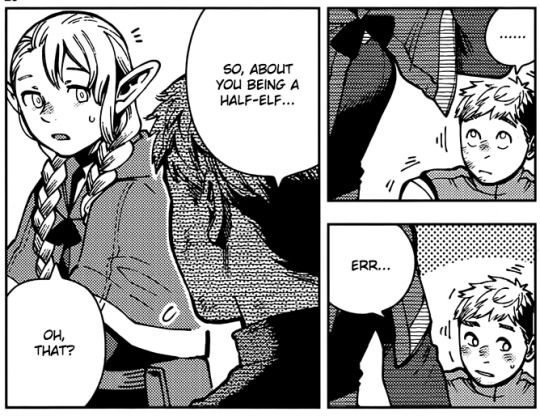
and look at how exasperated and resigned she looks
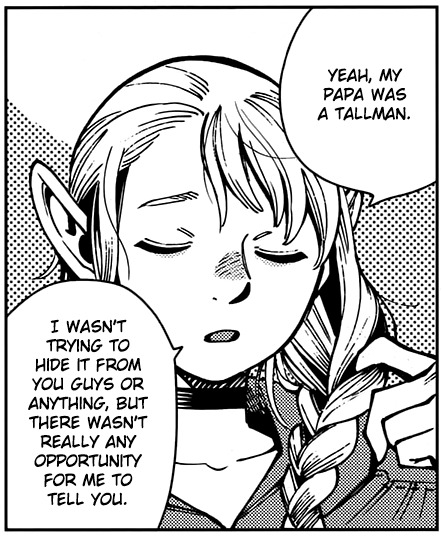
And like... she's right. Where would that come up in normal conversation? Why would she go out of her way to tell them? She's functionally a normal elf to other races anyway -- got the ears, the abnormally long "childhood", and the huge mana capacity. Unless it's directly relevant or important for people to know, I don't think it's all that strange or indicative of insecurity that she prefers not to bother with it.
(This combined with her sense of being an "outsider" to elf culture also explains why she thinks elf superiority is embarrassing. She sees the way elves treat short-lived races from the "outsider" perspective nonetheless, and thinks it's obnoxious; especially more so because she usually has to play the elf around short-lived races and deal with the reputation of arrogance that elves have built up.)
The sad thing is, this all means that... she doesn't actually fit in anywhere. She doesn't like going out West much because of how elves treat her. But she's also an outsider in the continents she was born in, treated like this exotic long-lived alien choosing to live among short-lived races for some reason. She is always an outsider, the Other, no matter where she goes. Add in the fact that she'll live longer than literally anyone she knows, and it's honestly kind of heartbreaking.
And I think that's the crux of it. Marcille really doesn't act like she's at all self-conscious about being a half-elf because of any feelings of inferiority or being half-made or whatever. She considers herself a perfectly legitimate being and might even, in some ways, consider herself superior to normal elves because she's not blind with elf supremacy or whatever. (And whatever "elven biases" she displays, all of them are born more out of the fact that she's kind of bad at conceptualizing how other races age and mature compared to herself, not that she actually considers herself better or more mature simply for being an elf.)
I think that whatever self-consciousness Marcille has about being a half-elf is, instead, related to terror and loneliness. The reminder that it ensures she'll never truly belong anywhere for the rest of her very long life. The reminder that, in truth, even she's not actually sure how old she is by other races' standards (hence the discomfort when asked how old she is). She doesn't want to not be a half elf, or be a full elf or full tall-man-- in her ideal world, she's still a half-elf. She just gets to live out her life at the same pace with the people she loves and doesn't have to say goodbye again and again and again until she dies.
and one last very important panel, right after Mithrun tells her that all her desires would be devoured
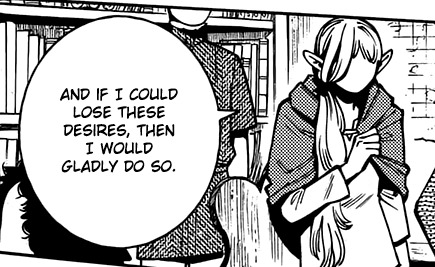
In her ideal world, she's still a half-elf and reality magically starts marching at her pace. But failing that, the second best thing is that she's still a half-elf-- but one who is able to accept reality and let go of her fear.
(But the rest of the story pans out the way it does because, to Marcille, taking reality apart and reshaping it was less scary than simply and fully reconciling with it.)
#asks#dungeon meshi manga spoilers#marcille donato#manga panel analysis#this is probably riddled with typos sorry#readmore cut bc it got long lmao#i ended up babbling about it bc it's such an important character detail to me#bc like... wow. she's so normal about it. she's literally just chilling.#the only thing that really bothers her is the material reality of it and how people treat her#the stereotypes the stigma etc. etc.#otherwise it just..#literally doesn't factor into her criteria for self-worth at all#the basic truth is that marcille likes herself on a fundamental level#she's not plagued by a deep and festering self-loathing the way a lot of characters in her archetype are#she likes herself and is proud of her successes and accomplishments#its just that shes terrified of failure and can have *episodes* of self-loathing when she fucks up#but who doesn't yknow#i know its a very slight nuance that makes very little difference in how her 'overachiever' problems manifest but its there#the sword of abandonment issues that hangs over her head has nothing to do with her self-worth or self-esteem or meeting her own standards#it has to do with the fear of not living up to *other* people's expectations and not being useful enough to be worth keeping around#she's good enough for herself but she's always so so so scared that she's not good enough for other people#i wont say much about what ryoko kui is saying using this as an allegory for real world racial biases but#dungeon meshi's treatment of marcille's relationship with her being half-elf is so incredibly important to me because it gets it so right.#a trauma about inferiority or being a half-being isn't inherent to the experience of being 'of two worlds' at all#that's something that's unfairly drilled into people by their environment#the *inherent* anguish is the loneliness. the constant longing. the fact that you are always homesick no matter where you are#always just a little bit of an outsider and never fully at home#and dungeon meshi gets that.#edit: cleaned it up a little
72 notes
·
View notes
Note
What are your thoughts on Dark Hook and Dark Swan in ouat in general?
To preface my thoughts, I want to first talk about how the writers of OUAT may have had good ideas for a show, but they lack the ability to execute them well. I think the main reason most of us loved the show was because seasons one and two were quite good - and those were the seasons that the writers had years in front of them to plan out - and then we were just into it. From season 3 onward, you can see the writing quality decline, from the occasional wtfs of s3 to the outright out-of-character, pointless, even backpedalling decisions pretty much all the characters took in s6 (I believe that the main reason s7 worked was because they had a lot of clean-slate characters, even Rogers had a different path to expand from). So there’s the theme of the writers having great ideas, but they can’t work on a very small time frame and develop a whole season in the span of a few months, so their ideas fall flat.
Onto Dark Hook and Dark Swan.
Again, Dark Swan is a great idea; Emma facing her strongest fears, just at the time that she’s fully ready to accept her future and move on from her past pain. But what they failed to realize is how complicated of a concept that is, and how to give it justice, it needs more than a half-season with a limited screentime because of the development of other characters, as all ensemble cast shows have to do. Add to that the fact that the writers wanted to pander to the audience with ANGST! for CS and the obligatory SQ-but-no-homo storyline... with a group of writers that can’t execute their ideas... on a limited screentime... you get this.
And this is a magnificent failure, not only by itself, but most importantly its consequences.
The Dark CS storyline has zero consequences. As proven by the horribly-written s6, Emma doesn’t learn to trust in her family. She doesn’t learn to stop working on her own, to recognize her work - I mean, when she comes back from the Underworld, she’s all “Boohoo I should never have gone there” like bish you saved Killian? You helped souls move on? Bish? - or learn from her own mistakes. Killian... he just falls deeper into self-loathing, and I’m not sure how that’s a positive development from him. He was already on the path of making himself better, of wanting to repent; he didn’t need to assist in nearly killing Emma’s entire family, close and extended, in order to have a development.
And of course, there’s the matter of the heavy things both of them did; Emma ripped out Violet’s heart to force her to break Henry’s heart in order to get his tears. She literally manipulated things and people’s - her own son’s! - emotions to get to the final point. Which may have been a noble cause, freeing Merlin from his prison, but immoral acts for a noble cause? That’s the work of an Anti-Hero character, not a Hero character. And that’s not something the writers realized let alone admitted in the narrative.
Same with saving Killian’s life, against his own dying wish. I actually recently remembered this exchange they had:
Killian: Do you have any idea how it feels to not be in control of yourself? [...]
Emma: I know exactly how it feels! Everyone I’ve ever loved abandoned me!
And like, what’s the connection between point A and point B? Killian is talking to her about becoming a puppet to someone, not having free will of choice, and Emma is talking about how she had no control over when people would leave her. One is a terrifying matter, and the other is something everyone goes through. You can’t choose when the people you love will die, and you will meet people who will hurt you.
But because Emma has had that latter a little too much, she wanted control over it. And with the Dark One’s powers, she was even more inclined to use them to make sure it doesn’t happen. Ergo, her taking away Killian’s consent, when he was choosing to die. And then again by hiding Excalibur from him, lying to him about it, forcing him to talk to her by summoning him when he had chosen to go away because he was enraged over the previous three betrayals, and then by taking away his memories when she concluded that he was “too far gone”. Again, manipulation and control, in order to save Killian’s life - when he didn’t want to be saved, btw - all acts of an Anti-Hero character.
And then you have Killian. I’ve said before how I think most of the things he said and done as a Dark One were Killian’s actual deep fears - that he had become a lovesick puppy dog, that Emma was eventually going to push him away and revert to her “orphan” state, that he had no hope of making amends for his villainous past, so might as well give up trying, and making sure Rumpelstiltskin doesn’t hurt him again - so having him say both things like “That’s why you’ll always be an orphan” and “I might have given you your wife back. Soiled, but returned” on the same episode, you kinda wonder, how much of that does he mean? What the hell is going on?
The fact that right after waking up, he desires to die because he thinks he deserves to more than Emma does, the fact that after Emma rescues him he’s a mess with guilt... those kinda point to the fact that he had some control over what he was doing, or at least his feelings behind them - that, for example, he regrets allowing the Dark Ones to nearly kill Emma’s family and friends just so he could have his revenge on Rumpelstiltskin.
So, you’ve got some heavy issues. Manipulation, betrayal of trust, controlling and disregard of consent on the one side, and humiliation, degradation and homicidal attempt on the other side.
What are the consequences of all that? Nothing. The Dark CS storyline is forgotten, Killian’s guilt over it is mentioned once in the later episodes and then never again.
All those required at least a moment to sit and talk about. Killian feeling guilty over it for about one episode - and just for the things he did! God forbid we have Emma face the emotional consequences her actions had on other people - doesn’t even begin to reach enough.
So overall, it was a very interesting concept, with a less than promising introduction and execution, and an outright disappointing and unrealistic conclusion. And I’m saying this as a CS fan - I’m not saying nothing of this should’ve happened. It was interesting to see how they happened, to see Emma’s and Killian’s deepest fears surface and take control of their actions, but it was disappointing to see that it lead to nothing. It was emotionally taxing, especially if you connected to the characters, and then it was nothing. It never happened, please look away and look! Cruella’s back and we got a villain with blue flaming hair please keep watching the show despite the fact that we disregard one of the oldest rules of storytelling by not providing Catharsis!
So yeah. Disappointing, 0/10, wouldn’t invest in anything A&E write again.
#lillpon goes meta#ouat#Captain Swan#Emma Swan#Killian Jones#ouat criticism#Anonymous#ask and ye shall receive
32 notes
·
View notes
Text
Two
┏━━━━━━ ◁▹ ━━━━━━┓
The celebration ended. All the people gathered in front of the altar sat in silence. Nobody moved. Except for one person. Milly.
She stood proudly. She was angry.
I was really surprised by that.
“Why are you angry Milly? Bishops are good for us. Appreciate it!”
While Savarver was approaching her, she started screaming. She kicked one of the lights right next to her pew. The light fell onto the ground and spattered.
“I can’t take it anymore! I don’t need you! I can get better!” – she shouted.
The bishop clutched her wrists with his long white hands. She tried to break away from him but she was too weak.
I heard Andre’s roar and I felt prickles down my spine. He was the most fierce and violent from the Niners. He swiftly walked towards them. Milly was still fighting but she didn’t have a chance. She belonged to him. Andre grabbed her by her neck. His eyes turned black in the moment of smearing her. He was terrifying. I looked as if he was choking her. Milly’s neck was slowly turning black. Her eyes became numb and she stopped striving against the bishop. She flagged on the pew but Savarver didn’t let her rest. He dragged her across the room.
And then I was finally beginning to see how those ceremonies were changing me. I was forgetting me all over again.
“Where are you taking her? What will happen to her?”
I heard a little gentle sob. I looked at the girl next to me. I saw little tears and automatically I was trying to touch her hand. I stopped halfway.
"You can’t! Stupid! You know what happens when you touch people!" - A quiet voice warned me.
So I didn’t do anything.
“Don’t worry, my dear citizens. Milly’s had a small attack. We will take care of her.” – Keons said quietly. He had this weird ability to calm us down just like Nills. He knew exactly what we needed to hear.
I waited until Bishops finally let us go to our rooms. They assured us that nothing bad had happened. Milly had an episode. It was happening all the time. We didn’t need to worry. Nothing bad happened. Nothing bad happened.
While I was leaving the chapel, I didn’t look at anyone. I closed the door of my room and I sighed with relief.
I tried to remember all those times when I had an episode. When I was smeared. However, I didn’t have any recollection of those moments. I got into bed and opened my laptop. I continued watching some stupid TV shows which I started in the morning. I wasn't even paying enough attention. I just wanted some noise. I needed something to break all this silence. But even this noise couldn’t help me today. My mind was overflowed with thoughts and pain and self-loathing.
“Just die already.”
“I’m sick of you.”
“You’re a f**king piece of shit.”
“You swine”
“I hate you, I hate you!”
I covered my ears using my hands as if it was the right way to get rid of the voices. But it wasn’t. They didn’t stop. There was the only way to muffle them a little.
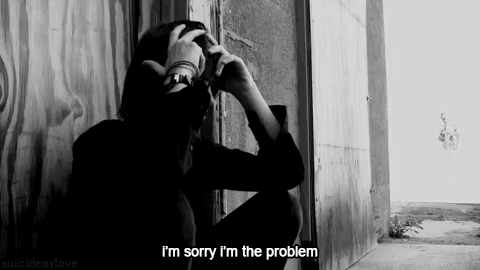
I knew I had imaginary problems. I didn't have the reason to be sad. I was just broken. Like a broken doll. I was made with a manufacturing defect. I wish I could be normal.
I never had the courage to go to the store and buy a razor blade. I didn’t want a cashier looking at me with pity. I didn't want to be seen as another "girl with imaginary problems".
I took an unused razor. I smashed it with scissors while hurting my fingers. I didn’t care.
I pulled out the razor blade. I looked at it closely. The light from the bedside lamp gently reflected off its edges.
I swiped it across my hips.
And I cried.
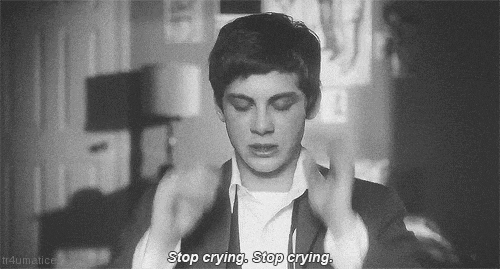
I couldn’t catch my breath.
The pain was so refreshing. The blood gently flew down my body. I repeated this action several times. It was awful. I was awful. But I did it only in places that were more or less unseen. I couldn’t let anybody to see that.
“What would they think of you? You’re a f**king failure.”
A couple of minutes later I was numb. Everything went quiet. The voices left me alone for a moment.
┗━━━━━━ ◁▹ ━━━━━━┛
9 notes
·
View notes
Text
Recursive Traps: Neurotic Disorders
Blushing is an example of a recursive structure. If blushing is embarrassing for me, then any feedback that I am blushing enhances the physiological reaction. The more obvious the blush, the more embarrassed I feel, and the more embarrassed I feel, the more I blush.
Recursion, in mathematics and computer science, is a method of defining functions in which the function being defined is applied within its own definition. The term is more generally used to describe a process of reciprocal feedback; for example, when two mirrors face each other a recurring sequence of nested images appears in each.
Positive Feedback
When the mirrors are parallel, the nested reflections do not go on forever, because real mirrors are not perfectly reflective. Pathogenic structures have no such limitation. In fact, some produce amplification or positive feedback—analogous to a microphone that has gotten too close to a speaker causing a rapid and relentless magnification of the sound to the extreme.
Positive feedback of the fight-or-flight response to threat is the cause of panic attacks. Specifically, the symptoms of fear, such as rapid heartbeat, are perceived as threatening ["perhaps I'll have a heart attack"], and so trigger the body to secrete more fight-or-flight hormones, which exacerbate the fear reaction, thereby causing increased heart rate, and so on.
Recursive Cognitive Structures
Some of life’s problems are self-correcting. You catch a cold, and the body’s immune system learns to recognize the pathogen and eventually defeat it. A child learning to ride a bicycle may fall a few times but will ultimately get it. People who have developed a pattern of self-sabotage may never self-correct, because the source of their emotional reaction is a belief within themselves that is often confirmed by the way things play out.
Some beliefs are special because they cause one to act in ways that confirm the original belief - even when it was not initially valid. For example, the belief that you will not be able to cope with a challenge tends to impair performance and make the unwanted outcome more likely.
Because the negative expectations promoted by the belief tends to exert a handicapping influence on performance, Self-Confirmatory Bias often becomes a Self-Fulfilling Prophecy, so once established a Pathogenic Belief can continue to diminish the quality of life indefinitely. Consider the effect of Barry's belief that he is socially awkward:
Barry's Self-Confirmatory BeliefsBarry, a clever but socially anxious engineer, can be very funny but is inarticulate in social settings in which he feels like a loser. The appraisals: “I’m a loser,” or “I am a witty guy” exist only in Barry’s mind and not in the objective world. Nevertheless, his subjective reality influences how he behaves in social situations. Whether he reacts to the snide insult at the office party with a witty come-back or with a humiliating silence depends to a large extent on his state of mind at the time. His retort is more likely to be clever if he is feeling confident than if he is in his “loser” trance.
He wants to bring on the clever version of himself and enjoy a social victory, but he expects to be intimidated. Observers who know Barry have their own predictions, but these are just the creative fictions of their minds. Only the actions Barry performs become part of objective reality; the other expectations and possibilities will fade into oblivion.
There is a battle between the creative fictions that will determine Barry's psychological state at the critical moment. On one side is his intention to be the cool and clever Barry, on the other is his expectation that he will be tongue tied. The winner of the battle will determine which version of Barry gets to be part objective reality. From our dispassionate perspective we can see they are both creative fictions, which are neither true nor false until Barry performs and actualizes one of them.
Barry’s story illustrates the cause-and-effect relationships that tend to result in self-confirmatory bias. Barry’s belief that he is socially inept sabotages his social performance, which confirms his handicapping belief. His social life is continually influenced by his expectation of social failure. The objective evidence that Barry does, in fact, perform poorly in social situations continually validates this expectation. Because it has a recursive structure, it can persist indefinitely and continue to have a negative impact on Barry’s actions and how his life unfolds. [Fortunately for Barry, once he appreciated how his trap worked he was able to use his problem-solving ability to develop a more self-serving cognitive structure.
Barry’s limitation does not come from outside of him, nor is it due to a slow wit. He is handicapped by his own self-sabotaging suggestion. In contrast to injuries that tend to heal with time, the source of Barry’s misery is the perspective from which he views social challenges.
A wide range of negatiave beliefs — including many of the Popular Thinking Errors — cause people like Barry to feel threatened in social situations. The state-dependent distortions associated with this defensive perspective is not as conducive to a clever come-back as a confident "let's have fun with this" perspective.
By acting as if the "socially awkward" perspective was valid he reifies and thereby strengthens that Barry is socially awkward. The tragedy is that Barry wants to be more socially successful and has the natrual gifts of a quick mind and great sense of humor. But his acceptance of the "Barry is socially awkward" fiction continually recreates the conditions that make his sad and diminish the quality of his life.
Another example of the power of a self-confirmatory bias is the fact that Bernie, who believes that everyone is trying to screw him so he better screw them first, is surrounded by people who are, in fact, trying to screw him. If you knew Bernie, you'd probably be trying to screw him too. In fact, Bernie does not want to be a bad guy. It is just that his beliefs about other people's motivations tend to elicit antagonistic behaviors toward them, provoking them to behave in ways that reify his negative beliefs.
The Consequences of Bernie's Expectations
Bernie reported: “During a chaotic situation at an airport ticket counter someone kicked me in the back of the leg. When I turned around to confront the asshole I saw a handicapped girl in a wheelchair, which had evidently rolled, out of control, down a ramp and into me. She was terrified by the rage on my face. I felt terrible.”
Bernie still cringes over this memory several years after the incident took place.
The facts that Barry often behaves incompetently is social situations, and that Bernie is continually surrounded by people who are angry at him confirms their pathogenic beliefs and thereby increase their certainty that the belief is valid. To escape this trap each will have to experiment with trying on different perspectives and acting as if they were valid.
Other people's thinking errors are more obvious than our own. Like Barry's friends, I see him as a successful and clever guy. Sadly, Barry resists their encouragement and my arguments. The handicapping self-fulfilling profesies of the past have reified the idea that he is a "loser." As long as buys into that creative fiction, he will continue to sabotage his social performance. It would be better for Barry if he could see things from my perspective.
As dispassionate observers, we can see things from a different perspective than Barry does. If you knew Barry you would agree with me that he is not defective — except for his belief that he is defective. Happily, beliefs are relatively easy to change [especially when compared to the work required to change behavioral and emotional reactions to the things that happen].
If you have not already reviewed the list of Popular Thinking Errors, now is a good time to do so. Below are some examples that relate to the social issues discussed above:
Note: Even when you feel certain that you know what another person is thinking or what is driving their actions, you are probably wrong and almost certainly missing some key elements of their experience. Nevertheless, attributing negative intent toward you by a lover can do permanent damage — even when the belief was initially incorrect!
The Recursive Trap of Addiction
Binge eating illustrates the recursive trap that maintains most addictive disorders. In this case the pleasurable activity of eating is used to escape self-awareness —
being overweight and feeling like a failure. The eating episode is interpreted as a failure which increases the motivation to escape self-awareness, which strengthens the entrapment mechanism.
Whenever she thinks about her obesity or sees herself in the mirror, she thinks self-critical thoughts and experiences shame. She can escape these unpleasant subjective phenomena by becoming absorbed in the pleasurable experience of eating. Once she stops eating, her awareness shifts to the perspective of the critical observer, she perceives the episode from a different perspective. She is no longer the creature driven to escape the pain of shame, she is now the self-critical observer who supports the self-loathing. The worse the self-criticism and shame, the more she seeks relief from self-awareness through escape into mindless eating. The more she follows this sequence the more she accepts it as the way things really are: "I am a shame-worthy failure." The more this concept is reified the worse grow her problems.
Recursive traps lie within the person. To appreciate your trap you have to step outside yourself to view it from the dispassionate observer's perspective. This is suprisingly difficult to do, because from your perspective the most compelling thing to think about is yourself.
0 notes